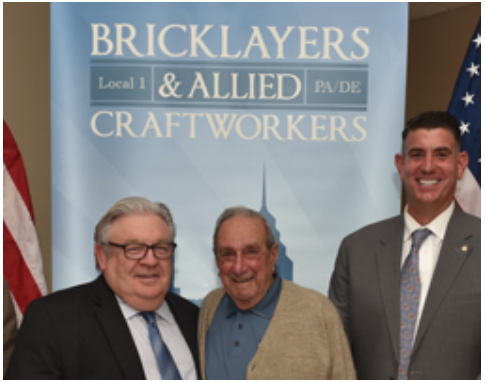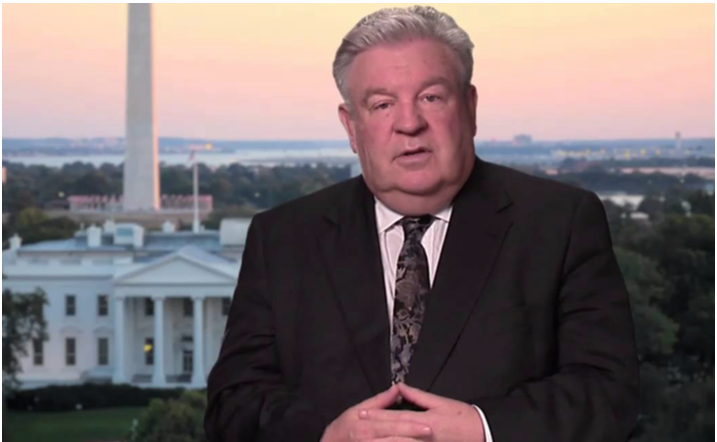DC DISPATCH-The inherent conflict between labor and management is a timeless struggle that America has grappled with since the Industrial Revolution.
The antipathy is rooted in differing objectives and constituencies; management is tasked with maximizing profits for stakeholders, while unions are tasked with advocating and protecting the employment rights of their members, who in turn use their specialized skills to create a return on invested capital for management. Top union brass such as Jimmy Hoffa and Caesar Chavez are folk heroes and revered by the working class but viewed as a thorn for management. Often, labor titans were evaluated for their ability to buck management demands by any means necessary, including strikes, which invited the ire of management.
However, the President of the Bricklayers Union, James Boland, (photo above) feels he can achieve better outcomes for his members by working in concert with his contractors. "Politics is the art of the possible. They (contractors) want jobs done. We have the same objective. Even though we may have different priorities, we both want the same outcome. I see this as a positive negotiating point, not a negative."
As President of the Bricklayers Union in Washington D.C., James Boland, an immigrant from Ireland, is proud of his heritage and history with labor. As I took a brief stroll around his office, I noticed photos of prominent politicians, spanning generations and a 49ers football helmet that caught my attention. As a former resident of San Francisco, President Boland got his start in the bricklaying world like every other member, as a former bricklayer. Having worked his way from the bottom to union management, Mr. Boland has a firm grasp of the issues that are facing the U.S. construction industry.
“The Bricklayers Union is important to me because I’ve spent my entire life as a member,” he noted. “As the longest union in continuous existence,” he continued, “the Bricklayers Union is very distinguished and has great persistence…The Union formed when the Baltimore and Philadelphia bricklayers locals merged in the mid-19th century to improve working conditions and relocated to Washington DC.”
One of the core directives the Bricklayers is tasked with includes determining the conditions of member employment, also known as collective bargaining. In the case of bricklayers, this process is negotiated with subcontractors. "Collective bargaining is done on a craft by craft basis (brick, block, tile, cinder, tile restoration, and refractory contractors) and, also by city basis. This includes healthcare, pensions, and training. President Boland is proud of the services offered to his members while conceding that "the programs are good but there's a whole lot of room for improvement. There is access to [our programs] provided members are able to work."

Boland acknowledges and laments the construction industry's struggle with opioids but praises his Member Assistance Program. "We encourage our members to get help if they have a substance abuse problem. The health, well-being, and advancement of our members is a priority for me. People struggling with mental health or stressful situations can call the [help] center anytime." As a progressive and hands-on President, Boland has even been known to pop in the call center to check on his pet program. "Our members spoke, and we listened very carefully."
Another great advantage of membership is the Union's ability to curry political influence and effect legislation on a federal level. The ability to count California Members of Congress such as Nancy Pelosi, Eric Swalwell and Sen. Kamala Harris as friends of the Union was critical in the drafting and passage of the School Construction Bill recently passed by Congress. Infrastructure bills translate into guaranteed jobs for union members.
Though active on the Federal level, President Boland views local participation as equally essential and cites the recent petition drives to overturn and/or address the right-to-work laws. These laws prevent agreements between the unions and employers. In states where right-to-work is settled law, unions can block implementation by referendum. President Boland was victorious in blocking right-to-work legislation in Missouri by putting the measure on the ballot.
With Democrats winning the governor’s mansions in both Michigan and Wisconsin, stronger laws protecting workers are part of his state legislative strategy. “I would look to the Bricklayers Union returning to our norms in places like Michigan and Wisconsin. We have managed to wake people up to the ruse that it (right-to-work) is.
Though President Boland is an American citizen, he still maintains strong ties to the political and business community in his homeland of Ireland. Proud of its period of economic expansion, Boland notes, "The Irish economy is in a recovery, but our workforce and main industries are evolving and adapting to current market conditions. Several concurrent generations of strong Irish political leadership have invested in education, and we are reaping the dividends today." Ireland used to rely on tourism to fuel its economic engine but today, "it’s biotech, software, and finance.”
He credits the booming Irish recovery, not on popular exports such as Kerrygold and Guinness, but to investments in infrastructure, education, and job training. Boland is skeptical about using tariffs to retrofit an economy “whose output is grounded in the service sector."
Boland also points out that even at the height of his country's notorious civil war, erecting a wall was not an option and he thinks that “President Trump can learn from Ireland's approach to [the] handling of national emergencies. Building a wall is a very primitive approach to solving a sophisticated problem. I grew up in a country (Ireland) that was in constant conflict for much of my life. The thought of building a wall between Northern and Southern Ireland never occurred to anybody because people didn't see it as a real solution. Building a Wall would be great for bricklayers and good for nobody else."
By taking active measures to promote block, brick, and masonry, Boland sees opportunity in need of a structural retrofit/overhaul. He views California's recent struggles through an empathetic lens but from a practical one as well. "Our materials (brick, cinder and masonry) can withstand higher temperatures and structural integrity when faced with a fire or earthquake." With billions of dollars in damage and surging premiums burdening homeowner insurance costs, he finds the answer “simple and straightforward: build with brick, block and masonry. As an advocate for promoting safe building standards, we are looking forward to enhancing our relationship with contractors in the Golden State."
The construction industry is set to enter an enormous expansion phase up to 2030. Present day, it is a $1.3 trillion industry and is expected to grow to two trillion by 2030. As the steward over this growth rate, President Boland should be a delighted man. Yet he still feels there is much to reform including pensions and healthcare, increasing female membership, embracing BIM (Building Information Modeling) as the standard for construction and job training. Boland's ability to craft and execute this workingman's creed with authenticity will likely cement his place among the titans of labor leaders for generations to come.
(Sara Corcoran is publisher of the National Courts Monitor and writes for CityWatch, Daily Koz, and other news outlets.) Edited for CityWatch by Linda Abrams.
















